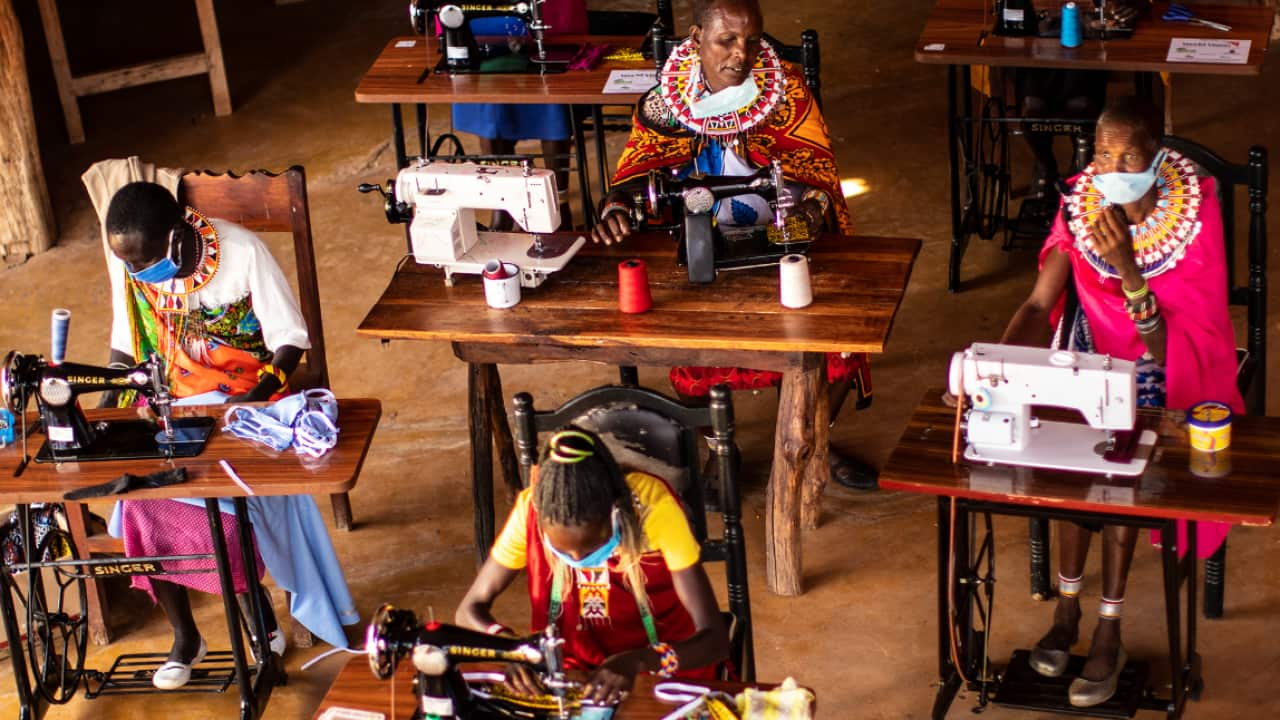Seketo Lenawala is a Maasai woman from Laikipia County in northern Kenya.
Like many women there, she was married young. She did not go to school and had nine children - three of them girls - and says she wants more for her daughters.
The 58-year-old hopes she has found the answer in joining a sewing business called Chui Mama. Chui is the Swahili word for leopard.
The group gives disadvantaged rural women a new way to earn a living by making sanitary pads, facemasks and mosquito nets, and in turn, is improving opportunities for local girls.
“Chui Mama has lifted me up from a point of desperation,” Ms Lenawala said. “Now I have an alternative source of income and I can provide for my family.” Growing up, it was almost impossible to find girls going to school in her community, Ms Lenawala said. Instead, they would be "married off".
Growing up, it was almost impossible to find girls going to school in her community, Ms Lenawala said. Instead, they would be "married off".

Seketo Lenawala is part of the Chui Mama sewing group. Source: Supplied
These days, almost 60 per cent of Kenyan girls complete primary school but many drop out of high school as teenagers. Stigma around periods is a factor.
“On those days, some girls do not go to school because of the embarrassment,” Ms Lenawala said.
Cecilia Valla is familiar with the challenges facing girls in Kenya. She grew up there and migrated to Australia 12 years ago. The 48-year-old is now World Vision Australia's country impact manager for Kenya.
“Many girls do not go to school during their menstrual cycle because they do not have sanitary pads to use,” she said. “And some of them decide to get married young and start a family.” According to UNICEF, Kenya has more than 500,000 child brides and almost one-quarter of all Kenyan girls are married before their 18th birthday. Around four per cent are married by the age of 15.
According to UNICEF, Kenya has more than 500,000 child brides and almost one-quarter of all Kenyan girls are married before their 18th birthday. Around four per cent are married by the age of 15.

Cecilia Valla works with World Vision Australia. Source: Cecilia Valla
Kenya is committed to stopping all child marriage by the end of this year, although many doubt the timing is achievable.
To improve the lives of women and girls, Kenyan woman Ellie Modesta co-founded Chui Mama in 2018, employing women struggling to survive in Laikipia. Some members are widows, others are single mothers and some are suffering debilitating injuries from childbirth.
“Through my own experience and my mother’s widowhood, I decided that I should also help my fellow women,” she said. “I want these women to stand on their own ground and support themselves.”
Ms Lenawala was among the first eight women to join the group when the project began. It has now grown to 355 members.
As part of $600,000 of World Vision Australia funding, extra sewing machines donated earlier this year are allowing the Chui Mama women to mass-produce cloth sanitary pads. Most are sold and some are given free to schoolgirls.
“The girls now have sanitary pads that they can use to go to school and do not have to stay home when they have their menstrual cycles,” Ms Valla said. "So these girls can finish secondary school and go on to higher education." This year has been especially challenging for the people of Laikipia.
This year has been especially challenging for the people of Laikipia.

The women at Chui Mama are learning to sew on machines, many for the first time. Source: World Vision Kenya
A long drought forced men to walk longer distances herding their livestock in search of food and water, leaving women to care for their children. The women traditionally earn money by making and selling beaded items to tourists but the COVID-19 pandemic has robbed them of that income.
“Tourists are no longer coming and therefore there is no one to sell their beads to,” World Vision Kenya’s Obadiah Kisang said.
As face coverings are compulsory in Kenya to stop the spread of the virus, the Chui Mama women decided to make cloth masks, and business is booming with thousands sold so far.
The masks are sold for around 65 Australian cents to local people. The income is also helping the women making them pay for their children, especially girls, to finish school. “Change is good,” Ms Lenawala said. “With an education, my daughters have a way out of poverty.”
“Change is good,” Ms Lenawala said. “With an education, my daughters have a way out of poverty.”

Wearing a face covering is compulsory in Kenya due to COVID-19. Source: World Vision Kenya
“The pandemic has presented a business opportunity for these women,” Mr Kisang said. "To see opportunity in a problem is not very common. And this group has exploited a problem to make a living out of it."
Chui Mama is also supported by the Swedish Embassy in Nairobi and may soon be adopted in other disadvantaged areas.
“The government of Kenya has identified it as a good model to empower women,” Mr Kisang said.
“This is one of the greatest innovations [I’ve seen] and it is changing lives within a very short time.”



